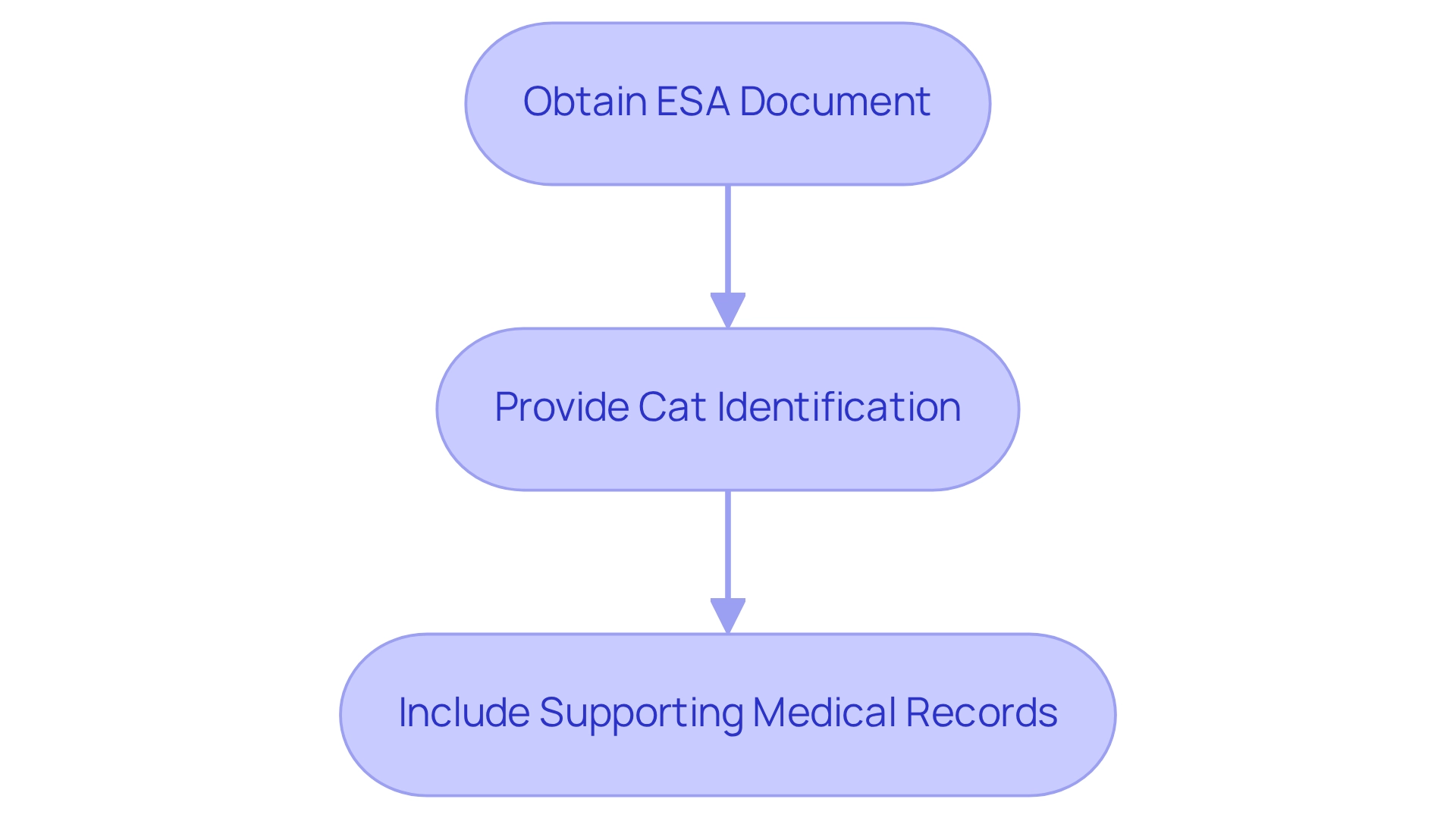

Cat Emotional Support Animal Registration: Essential Steps to Follow
by Lena Park
Last updated: August 13, 2025
Verified and Approved by:
Angela Morris,
MSW, LCSW
Fact Checked

Overview
The essential steps for registering a cat as an emotional support animal (ESA) begin with consulting a licensed mental health professional. This is a crucial first step in addressing the emotional challenges you may be facing. Gathering the required documentation and completing the registration process through an authorized service can feel overwhelming, but it’s a journey toward healing and support.
It’s important to understand that obtaining a valid ESA letter is not just a formality; it plays a vital role in accessing benefits under the Fair Housing Act. This letter ensures that your emotional support cat can be by your side, contributing positively to your mental well-being.
Remember, you are not alone in this process, and there are compassionate solutions available to help you navigate your emotional journey.
Introduction
In the evolving landscape of mental health support, emotional support animals (ESAs) have emerged as vital companions for many individuals grappling with various psychological challenges. Among these, emotional support cats are gaining recognition for their unique ability to provide comfort and stability.
For those facing emotional struggles, understanding the eligibility criteria, necessary documentation, and rights associated with owning an emotional support cat is essential.
- Have you ever felt overwhelmed by your mental health issues?
- The journey toward finding solace can be daunting, but securing a legitimate ESA letter offers a supportive solution.
- Navigating housing regulations and ensuring compliance with legal standards may seem complex, yet each step taken is a step toward healing.
This article delves into the comprehensive process of acquiring an emotional support cat, highlighting the critical role these animals play in enhancing emotional well-being and the legal protections afforded to their owners.
Remember, you are not alone in this journey; the support you seek is within reach.
Understand the Eligibility Criteria for Emotional Support Cats
Qualifying for cat emotional support animal registration is an important step for individuals facing mental health challenges, such as anxiety, depression, or PTSD. Many people are increasingly relying on emotional assistance animals and service dogs, highlighting their vital role in enhancing mental wellness and public welfare. It is essential to discuss your situation with a certified mental wellness expert, who can evaluate your circumstances and determine if cat emotional support animal registration is necessary for your therapeutic needs. This consultation is a crucial part of the process, ensuring you receive personalized guidance tailored to your situation.
Your cat should be well-behaved and adaptable to various environments, as this greatly enhances its effectiveness as an emotional support animal (ESA). While specific training is not required for emotional assistance cats, they should exhibit friendly and non-aggressive behavior. Mental wellness experts emphasize the importance of the bond between the person and the cat, as this relationship significantly contributes to emotional stability and overall well-being.
It’s also worth considering your lifestyle and personality when choosing an emotional support cat. Some breeds, such as the calm and gentle Ragdoll or the affectionate and sociable Maine Coon, may naturally align with your daily routine and emotional needs. Research different breeds and consider traits like energy level, sociability, and adaptability. Selecting a cat whose temperament matches your lifestyle can help create a strong, supportive bond and a harmonious living environment.
Unlike service animals, emotional support cats do not need specialized training to perform specific tasks. Their primary role is to offer comfort simply by being present and providing companionship. All that’s required is a loving home and attentive care—there’s no need to teach your cat any special skills or tricks. The key is ensuring your cat’s temperament and behavior are suited to providing steady support during times of emotional need.
Looking ahead to 2025, the eligibility requirements for cat emotional support animal registration will continue to focus on the individual’s mental wellness needs, rather than the animal’s training. This approach underscores the significance of the therapeutic relationship, making it essential for prospective ESA owners to engage with qualified professionals to navigate the registration process. Furthermore, Wellness Wag offers an affordable and efficient way to obtain ESA documentation, with interest-free payment options starting at $32.25. Clients can receive their ESA letters within 24 hours after consultation, ensuring prompt access to vital mental health support. Their commitment to client satisfaction is reinforced by a money-back guarantee, making Wellness Wag a reliable resource for those seeking emotional assistance through their beloved pets.
What Are Some Common Breeds Recommended for Emotional Support Cats?
Any cat with a gentle, affectionate temperament can be an effective emotional support animal, but some breeds are especially known for their calm, comforting nature.
-
Ragdoll – Calm and loving, often happy to be held, making them excellent for close companionship.
-
Siamese – Social, vocal, and highly bonded with their owners, offering attentive comfort.
-
Maine Coon – Friendly, adaptable, and gentle, well-suited for families.
-
British Shorthair – Laid-back and affectionate, creating a steady, reassuring presence.
-
Scottish Fold – Sweet, easygoing, and known for staying close to their people.
While breed traits can be a helpful guide, individual personality is what matters most. Choose a cat whose natural disposition aligns with your emotional needs for the best support.
Where Can You Get an Emotional Support Cat?
Choosing the right cat to become your emotional support companion is an important step in your journey. You have several options, each with its own benefits depending on your needs and preferences.
-
Animal Shelters and Rescues – Local shelters, such as your Humane Society or SPCA, often have cats in need of a home. Adopting from a shelter gives a cat a second chance while letting you meet different personalities to find a good match.
-
Reputable Breeders – If you prefer a specific breed for temperament or allergy reasons, an ethical breeder may be an option. Choose breeders who focus on health, socialization, and responsible practices.
-
Online Pet Adoption Platforms – Directories like Petfinder, Adopt-a-Pet, and Rescue Me! connect you with adoptable cats from shelters and rescue groups nationwide, making it easier to find a companion that suits your lifestyle.
Whether you choose a senior cat or a playful kitten, building a strong bond will help your emotional support cat provide the comfort and stability you need.
How Much Does an Emotional Support Cat Typically Cost?
The cost of an emotional support cat can vary widely depending on factors such as breed, age, and where you choose to adopt or purchase. Purebred cats from reputable breeders often range from $500 to $2,000 or more, especially for popular breeds like Ragdolls or Bengals.
Adopting from a local shelter or rescue, such as the ASPCA or Best Friends Animal Society, is usually more affordable, with fees typically between $50 and $200. These adoption fees often include initial vaccinations and spay/neuter services, helping reduce your upfront costs while supporting community animal welfare efforts.
In addition to the initial cost, be prepared for ongoing expenses like food, veterinary care, and supplies. For many ESA owners, the emotional benefits and companionship far outweigh these costs, making adoption an economical and compassionate choice.
Gather Required Documentation for Registration
Successfully completing the cat emotional support animal registration can feel overwhelming, but gathering the right documentation can ease this process.
- ESA Document: It’s important to obtain a signed note from a licensed mental health professional that outlines your need for an ESA due to a diagnosed mental health condition. This document should be printed on official letterhead and include the professional’s contact information to ensure its validity. This essential document forms the basis of your request, allowing you to access the benefits of cat emotional support animal registration, especially in university housing where these animals are welcomed to promote equal opportunities for students with disabilities. To simplify this process, consider using Wellness Wag’s telehealth services to obtain a legitimate ESA letter online.
- Cat Identification: You will need to provide identification for your cat, such as a recent photo or microchip registration, to confirm ownership.
- Supporting Medical Records: Including any additional medical records that may support your case for needing an ESA is beneficial. These documents should be current and clearly express your mental health needs.
Research indicates that emotional support animals, including those with cat emotional support animal registration, can significantly enhance mental well-being by alleviating symptoms of various conditions. In fact, over 80% of pet owners found comfort in their pets during the isolation of the COVID-19 pandemic, highlighting the emotional support that animals provide. Ensuring that all documents are comprehensive and up-to-date will help facilitate a smoother registration process and empower you to advocate for your rights under the Fair Housing Act and the Air Carrier Access Act. It’s also crucial to understand that there is a common misconception that ESAs are the same as service animals; recognizing this distinction is vital for proper registration. Furthermore, research shows that ESAs can help reduce blood pressure and heart rate, demonstrating their dual benefits in providing emotional support and enhancing physical health. If you have any questions or concerns about this process, please refer to our FAQs or reach out to us directly.
Can Cats Qualify as Service or Psychiatric Service Animals?
Under the Americans with Disabilities Act (ADA), only dogs and, in some cases, miniature horses can be recognized as service animals. To qualify, the animal must be trained to perform specific tasks that assist a person with a disability. While cats provide meaningful emotional support and companionship, they typically cannot be trained to meet these task-based requirements.
This distinction is important because service animals and emotional support animals have different roles, protections, and legal standards. Cats may not qualify as service or psychiatric service animals, but they excel as emotional support animals, offering comfort and emotional stability to those who need it most.

Obtain an ESA Letter from a Licensed Mental Health Professional
Obtaining an ESA document begins with a compassionate step: arranging a meeting with a licensed mental wellness expert. This initial consultation is an opportunity for you to share your mental health history and discuss how a cat emotional support animal can positively impact your life. Typically, these consultations last about 30 to 60 minutes, allowing the specialist to fully understand and evaluate your needs. If deemed qualified, the professional will create an ESA document that outlines your diagnosis, recommends a cat emotional support animal, and includes their contact details. This letter is essential for your cat emotional support animal registration and should be kept safe for future reference.
At Wellness Wag, your privacy is our priority. We adhere to HIPAA regulations, ensuring your medical information is handled with the utmost care. We encourage you to review our Notice of Privacy Practices, which outlines how we may use and share your medical information. It’s essential to be cautious of online services that promise immediate ESA documents without proper evaluations, as these can often be misleading. Experts have noted the increasing reliance on ESAs and service dogs, highlighting their crucial role in mental health care. By working with certified professionals at Wellness Wag, you can be assured of receiving a valid ESA document, which is vital for your cat emotional support animal registration, as well as for securing housing and travel arrangements under the Fair Housing Act and Air Carrier Access Act.
Our clients have expressed their gratitude for the support they received. For instance, James B. shared, “I had a great experience with Wellness Wag. The approval process for my ESA was easy and hassle-free,” while Linda S. remarked, “Wellness Wag made getting an Emotional Support Animal a breeze.” These testimonials underscore the importance of obtaining a valid ESA document and the positive impact it can have on your journey towards better mental health.
Complete the Registration Process with an Authorized Service
After you receive your ESA documentation from Wellness Wag, you can begin the registration process. While registering your cat as an emotional support animal (ESA) isn’t legally required, many individuals choose to do so to enhance its legitimacy. It’s important to explore approved services that specialize in cat emotional support animal registration, such as Wellness Wag, which offers a straightforward procedure for obtaining ESA documents through personalized consultations with certified healthcare professionals. Typically, you’ll need to complete certain forms, providing your ESA document along with any additional paperwork requested.
Once you submit your application, you may receive an ESA ID card and certificate, which can be incredibly helpful when dealing with landlords or airlines. Selecting a reputable service that complies with legal standards is vital to ensure your registration is valid. Wellness Wag aims to deliver your ESA letter within 24 hours of approval, providing a quick turnaround to meet your needs. After placing an order, you will receive a confirmation email detailing your purchase.
Statistics reveal that a significant percentage of ESA owners—around 70%—opt for cat emotional support animal registration, underscoring the importance of this step in navigating housing regulations and travel restrictions effectively. This trend is further supported by a growing demand for service animals, which has risen by 20% annually in Australia, reflecting an increasing recognition of the benefits of animal companionship.
Understanding the legal protections offered by the Fair Housing Act can empower ESA owners, as it requires reasonable accommodations for individuals with disabilities. A study by Chin et al. (2023) found that during the COVID-19 pandemic, pet ownership was linked to improved mental health, highlighting the emotional support that ESAs can provide. This knowledge is crucial for advocating for your rights and addressing any potential discrimination you may face. Additionally, insights from the case study titled “Legal Protections for Emotional Support Animals” clarify the legal differences between ESAs and service animals, emphasizing the importance of understanding your rights as an ESA owner.
Does the ADA Cover Emotional Support Cats?
Many people assume emotional support animals have the same rights as service animals, but the Americans with Disabilities Act (ADA) treats them differently. Service dogs are allowed in most public places, such as restaurants, shops, and medical facilities. Emotional support cats, however, do not have these same public access rights under the ADA.
Your emotional support cat can still offer valuable companionship at home and may be allowed when traveling or in housing situations under other federal laws, like the Fair Housing Act. Understanding this distinction helps you set realistic expectations and advocate effectively for your rights as an ESA owner.
Are There Limits to the Number of Emotional Support Animals You Can Have?
There is no federal law setting a maximum number of emotional support animals you can own. Each ESA must be supported by a valid letter from a licensed mental health professional and contribute to your well-being.
Local laws, housing policies, and landlord requirements may still apply. Some areas limit the number of pets per household, and landlords may ask for documentation explaining the need for multiple ESAs. The Fair Housing Act protects your right to live with ESAs, but it also requires that their presence does not cause property damage or disrupt other residents.
Know Your Rights and Responsibilities as an ESA Owner
As an emotional assistance animal owner, you face unique challenges that can often feel overwhelming. You are entitled to specific rights under federal laws, particularly the Fair Housing Act, which allows you to reside with your ESA in housing that typically prohibits pets. By presenting a valid ESA letter to your landlord, you can create a supportive environment for yourself. In 2025, it’s important to remember that while airlines are required to accommodate ESAs, their policies can vary significantly. For example, United Airlines has accounted for approximately 40% of all reported pet deaths during transport, highlighting the need to verify the airline’s requirements before you travel.
Your responsibilities as an ESA owner extend beyond simply having the necessary documentation. It is essential to ensure that your ESA is well-behaved and does not disrupt your living environment. This includes cleaning up after your pet and ensuring it does not pose a threat to others. The Fair Housing Act prohibits discrimination against individuals with emotional assistance animals, granting you vital legal protections that help you live with your assistance animal without incurring additional fees or restrictions.
Real-world examples show how ESA owners have successfully navigated housing and travel challenges. Many individuals have shared their positive experiences advocating for their rights under the Fair Housing Act, enabling them to maintain their mental well-being through the companionship of their ESAs. A significant case study, ‘Legal Protections for ESA Owners,’ emphasizes the crucial legal safeguards that enhance your rights to reside with your assistance animals. Understanding these rights and responsibilities is vital for fostering a harmonious relationship with your ESA while ensuring compliance with legal standards. Furthermore, the increasing demand for assistance dogs and mental health support programs underscores the importance of ESAs in providing therapeutic companionship.
If you have not yet selected your emotional support cat, take time to choose one that is friendly, adaptable, and well-suited to living in close quarters, important traits for apartment or shared housing situations.
Once you have your ESA letter and supporting records, present them along with your cat’s identification to your landlord or housing provider to establish your rights under the Fair Housing Act. You should also check with your homeowner’s or renter’s insurance provider to see if your policy needs to be updated. Taking these extra steps helps ensure a smooth transition and a supportive living arrangement for both you and your cat.
Understanding ESA Access Rights and Housing Expectations
It’s important to understand that emotional support animals, including cats, do not have the same public access rights as service animals under the Americans with Disabilities Act (ADA). Service dogs are legally permitted in most public spaces such as restaurants, stores, and medical facilities, but ESAs are not granted these broad protections. The Air Carrier Access Act (ACAA) also does not guarantee unrestricted air travel for ESAs, so it’s best to check the latest airline policies and prepare the required documentation well in advance.
Landlords are generally required under the Fair Housing Act to accommodate your ESA, but these protections come with reasonable expectations. Your cat must remain under your control, be well-behaved, and not pose a threat or create significant disturbances. If your ESA shows aggressive behavior or causes ongoing problems, your housing request can legally be denied. Presenting a valid ESA letter and demonstrating responsible pet ownership will help maintain a positive relationship with your landlord and neighbors
Traveling With Your Emotional Support Cat: Airline Policies
Air travel rules for emotional support cats have changed in recent years. Most U.S. airlines no longer allow ESAs in the cabin, but a few domestic carriers like JetBlue, and some international airlines, may still permit them under specific conditions.
Before booking, research the airline’s current ESA policy and contact them directly to confirm requirements. These may include advance notice, health certificates, and proof of good behavior. Because regulations can change frequently, always verify details before your trip to avoid last-minute issues.
What If a Landlord Rejects Your ESA Letter?
If your landlord refuses to accept your ESA letter, start by confirming that it is current, issued by a licensed mental health professional, and meets all requirements under the Fair Housing Act. Review the letter carefully to ensure it includes the necessary details, such as your provider’s credentials and contact information.
If the issue continues, open a respectful conversation with your landlord. Provide clear information about your rights under the Fair Housing Act and consider sharing official resources from the U.S. Department of Housing and Urban Development (HUD) to help clarify any misunderstandings.
When valid documentation is still not accepted, you can file a formal complaint with HUD to address potential discrimination. Keep thorough records of all communications, as this documentation can strengthen your case if further action becomes necessary.
Caring for Your Emotional Support Cat: Best Practices and Preventive Measures
Caring for your emotional support cat is an important part of maintaining the mutual bond you share. Just as your ESA supports your well-being, you should safeguard their health and happiness through attentive care.
Keep vaccinations up to date and schedule regular veterinary checkups to protect against common illnesses such as rabies, feline distemper, and feline leukemia. Many local councils and housing providers require proof of current vaccinations, especially in shared living spaces.
At home, provide a safe and enriching environment with:
-
Fresh water and nutritious food suited to your cat’s age and dietary needs
-
A clean litter box and regular grooming
-
Toys, scratching posts, and other enrichment to encourage play and mental stimulation
Routine preventive treatments for fleas, ticks, and worms, as recommended by your vet, will further protect your cat’s health. Most importantly, spend time interacting with your ESA through petting, gentle play, and calm routines to strengthen your bond and ensure they continue providing comfort and emotional stability in your life.
Conclusion
Emotional support cats play a vital role in enhancing the mental well-being of those facing psychological challenges. It’s essential to understand the eligibility criteria for acquiring an emotional support cat as the first step toward healing. Engaging with licensed mental health professionals is crucial, as they can assess individual needs and provide the necessary ESA letter. This letter is not just a formality; it legitimizes the bond between the individual and the cat, making it easier to access housing and travel accommodations.
Gathering the required documentation, including the ESA letter, cat identification, and supporting medical records, is key to ensuring a smooth registration process. While registration isn’t legally mandated, many individuals choose to register their ESAs to enhance their legitimacy. This choice empowers them with the rights afforded by the Fair Housing Act and helps combat potential discrimination they may encounter in housing and travel situations.
As an ESA owner, it is vital to know your rights and responsibilities. The Fair Housing Act guarantees the right to live with an emotional support animal without incurring additional fees or facing restrictions. Equally important is maintaining a well-behaved ESA, which fosters a positive living environment and upholds the responsibilities associated with pet ownership.
In summary, the journey toward emotional healing with the companionship of an emotional support cat is both accessible and rewarding. By understanding the legal protections, engaging with professionals, and fulfilling responsibilities as an ESA owner, individuals can navigate their mental health challenges more effectively. The support of these remarkable animals is not merely a privilege; it is a pathway to enhanced emotional stability and well-being.
Frequently Asked Questions
What is the purpose of cat emotional support animal registration?
Cat emotional support animal registration is intended to assist individuals facing mental health challenges, such as anxiety, depression, or PTSD, by providing them with emotional support through their pet.
How can I determine if I need cat emotional support animal registration?
It is essential to discuss your situation with a certified mental wellness expert who can evaluate your circumstances and determine if registration is necessary for your therapeutic needs.
What qualities should my cat have to be an effective emotional support animal?
Your cat should be well-behaved and adaptable to various environments, exhibiting friendly and non-aggressive behavior, as these traits enhance its effectiveness as an emotional support animal.
Will the eligibility requirements for cat emotional support animal registration change in the future?
Yes, looking ahead to 2025, the eligibility requirements will continue to focus on the individual’s mental wellness needs rather than the animal’s training, emphasizing the importance of the therapeutic relationship.
How can I obtain the necessary documentation for cat emotional support animal registration?
You need to obtain a signed note from a licensed mental health professional outlining your need for an ESA, provide identification for your cat, and include any supporting medical records that express your mental health needs.
What is the role of Wellness Wag in the registration process?
Wellness Wag offers an affordable and efficient way to obtain ESA documentation, with interest-free payment options and prompt delivery of ESA letters within 24 hours after consultation, along with a money-back guarantee.
What documents are required for the registration process?
Required documents include an ESA document from a licensed mental health professional, cat identification (such as a photo or microchip registration), and any supporting medical records.
How do emotional support animals impact mental well-being?
Research indicates that emotional support animals can significantly enhance mental well-being by alleviating symptoms of various conditions, with many pet owners reporting comfort from their pets during challenging times.
What is the difference between emotional support animals and service animals?
Emotional support animals provide comfort and support for mental health needs, while service animals are trained to perform specific tasks for individuals with disabilities. Understanding this distinction is vital for proper registration.
Certify Your Emotional Support Animal Today

Why You Can Rely on Us?
At Wellness Wag, we believe your pet deserves care rooted in both science and compassion. Each article is carefully researched, written in clear language for pet owners, and then reviewed by qualified professionals to ensure the information is evidence-based, current, and practical for real-life care. Our goal is to help you feel confident in making informed decisions about your pet’s health and well-being.
Reviewed by
Angela Morris, MSW, LCSW
Angela is a licensed clinical social worker with 20 years of experience in patient advocacy and community mental health. She has assisted numerous clients with ESA evaluations and brings a deep understanding of disability accommodations, ensuring that all information is accurate, supportive, and practical.

Written by :
Lena Park
Last Updated :
August 13, 2025












